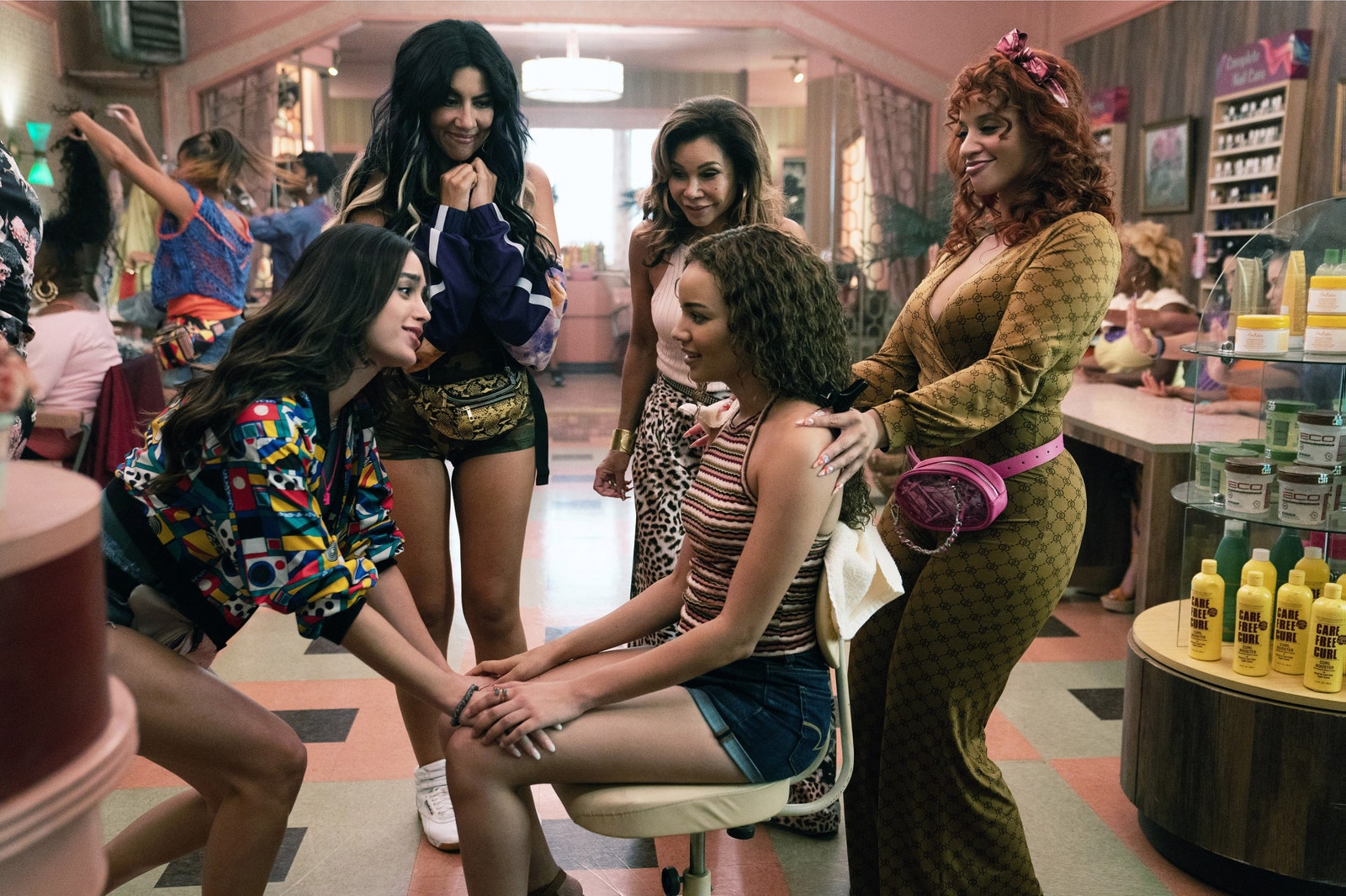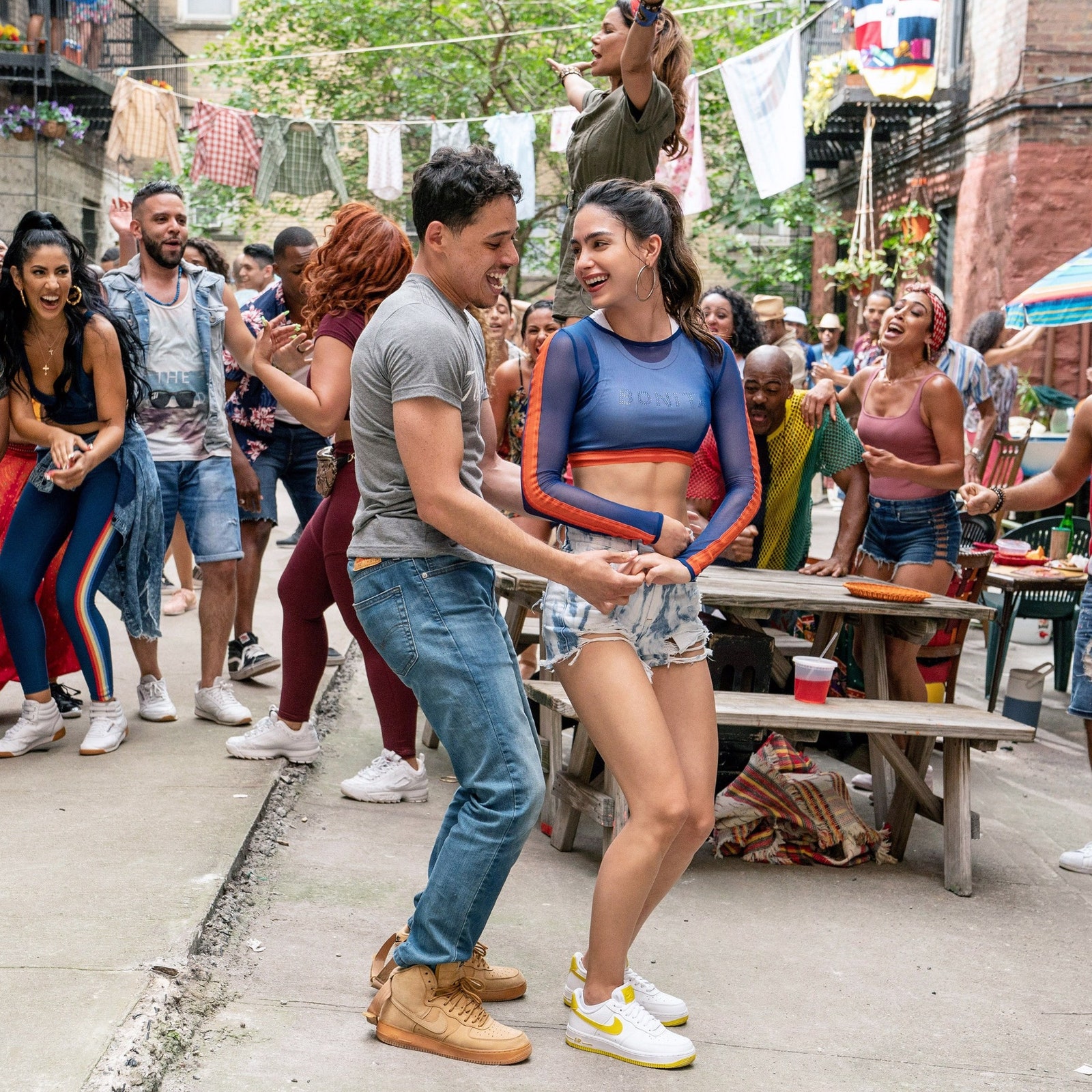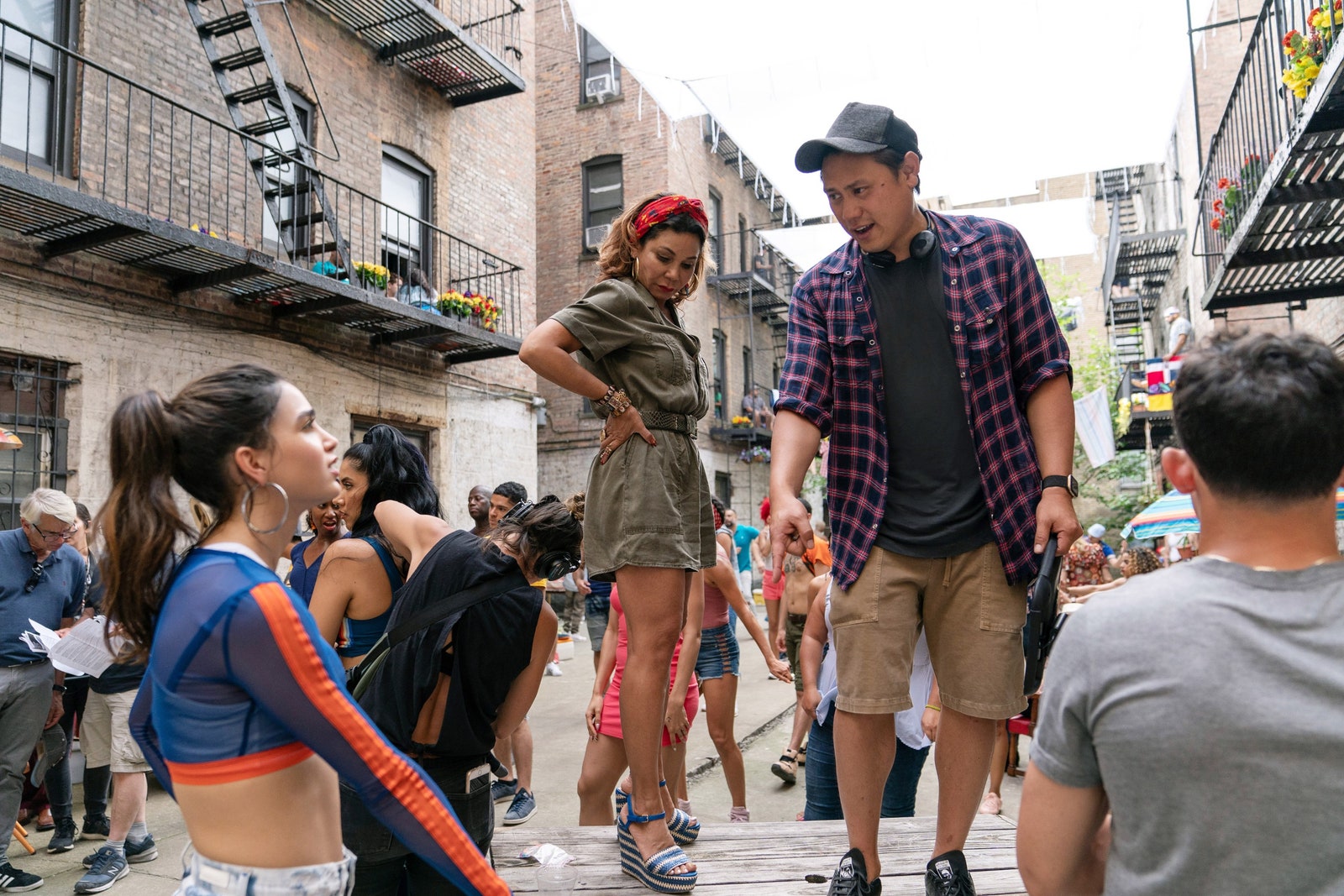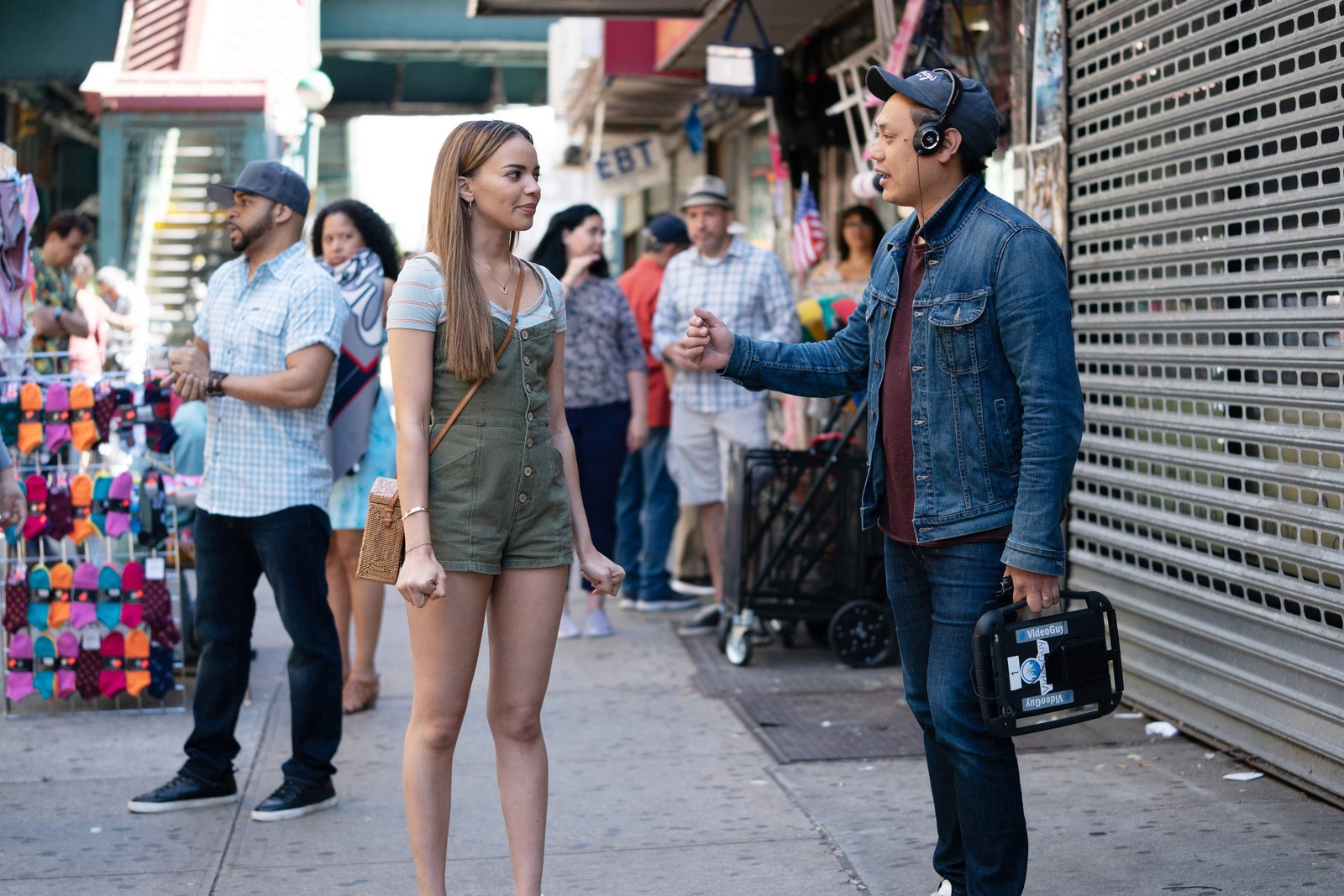“There will be a before and after.”

For Melissa Barrera and Leslie Grace, ‘In the Heights’ Is Setting a New Hollywood Standard
It took 13 years, three production companies, and a global pandemic for the movie version of Lin-Manuel Miranda’s Tony-winning musical In the Heights to get its grand theatrical debut. But the wait was worth it: The much-anticipated film adaptation, now in theaters, brings Latinx joy to the big screen in a way rarely seen before. It is an unabashed, beautiful ode to Black and brown communities everywhere.
With patience, fortitude, and an untold amount of cafecito, the team behind the film overcame a lot of obstacles to deliver a touching tribute to the vibrant Washington Heights neighborhood in New York City, a community made up almost exclusively of Latinx-identifying individuals. The film—like the musical—follows a young bodega owner named Usnavi de la Vega as he wrestles with his dream of moving back to the Dominican Republic after inheriting $96,000, a life-changing amount of money. While Usnavi is the center, the story is much bigger tale of how a group of neighbors became family; it examines each of their dreams, the challenges they’ve had to overcome, and the sacrifices they’ve made in the face of adversity. It's about how resilient the Latinx community is as a whole.
The musical doesn’t shy away from topics of racism, microaggression, or otherness. Rather, it embraces these undeniable facets of the Latinx experience, especially for immigrants and first-generation Americans, without making it the sole focus. These difficulties never overshadow the happiness, love, and joy found within the Latinx community. Home-cooked meals, block parties, and salon chisme all provide a depth to this group of people often overlooked on the big screen.
With Crazy Rich Asians director Jon M. Chu at the helm and a screenplay by Quiara Alegría Hudes, Manuel’s musical spectacular also gets a Hollywood-worthy update with a superstar cast. Hamilton’s Anthony Ramos stars as Usnavi, and he's joined by Latinx powerhouses like Marc Anthony, Daphne Rubin-Vega, Olga Merediz (who reprised her role as Abuela Claudia), Stephanie Beatriz, Dascha Polanco, Jimmy Smits, and others who add más sabor to the barrio-set film.
Among them are two rising stars: Mexican telenovela actor Melissa Barrera appears as Vanessa, Usnavi’s love interest and a fashion designer who dreams of living in downtown Manhattan; Leslie Grace, a Dominican American singer-songwriter, plays Nina Rosario, a Stanford student who carries the weight of her neighborhood on her shoulders.
Over a 40-minute Zoom discussion, we talk to Barrera and Grace about bringing this popular musical to the big screen, representation in Hollywood, what it’s really like to work with Lin-Manuel Miranda, and so much more In the Heights scoop.
Below is a transcript that has been condensed and edited for clarity, full of love and excitement for their proudly Latinx film, no shortage of laughter, and advice for other Latinx people on how to make their own dreams come true.
Glamour: I’d love to start off in the same vein as the movie: What does sueñito (little dream) mean to each of you?
Leslie Grace: Sueñito means all of your deepest desires, even the ones you keep close in your heart and hide from everyone else because you're so afraid that they might not happen if you say them out loud. That's what's sueñito means to me: what you're willing to risk it all for, what you're willing to fight for, and that thing that lights you up.
Melissa Barrera: I love the word sueñito, because I feel like it's such a Latinx thing. In Mexico, we add “-ito” or “-ita” at the end of words all the time. It's a way of making things feel manageable. A dream can feel daunting and intimidating and sometimes impossible, but adding the “-ito” makes it possible. The sueñito is this little step you want to take. After that you have your next sueñito, and the next. I love that it’s the theme of the movie, because it makes everyone’s dream feel possible.
Speaking of dreams, we see Nina and Vanessa struggle between following the dreams of their parents and the responsibility to always represent and uplift their community. Simultaneously, they have to deal with racism and a sense of otherness while trying to pursue these dreams. Can you talk about why this was so important to represent onscreen?
Grace: Specifically in the Latinx community, it's a very rarely told story that we get to see through this film: People that are first generation, or immigrants, are shown in this light of “I'm going to find a way to make this little dream possible. It's not just for me; it's for everything the generation before me did.” I didn't grow up seeing movies that represented that, and most definitely not with people that look like me. More than anything, I think it reflects a sense of potential that our generation deserves to see. It's long overdue that people from where we're from and that look like us finally get to see that their dreams are possible too.
Barrera: It's really amazing that this movie has so many different stories and experiences in it. It's so important to see all the realities and different types of experiences that exist within a community so that everyone feels seen. This movie touches upon microaggressions and racism and all the things the Latinx community goes through that are so important to showcase because it's a reality. But the message behind it is that despite all the obstacles, despite the struggle, we still come together and celebrate and support each other in the pursuit of our dreams. That's what sets In the Heights apart.
Anthony Ramos and Melissa Barrera
Corey Hawkins and Leslie Grace
Warner Bros./Everett CollectionYou touched on something really important: The film puts powerful Latinas at the forefront and emphasizes their importance in shaping who we are. I would love to know who some of your Latina idols are, and why you admire them.
Grace: Daphne Rubin-Vega.
Barrera: Oh my God, an icon! I was blessed to be able to share a screen with her and share a summer with her and call her a friend. Leslie and I were both huge fans of Daphne as Mimi in Rent. She inspired me and basically single-handedly pushed me to pursue a career in musical theater because I was like, “I can play Mimi in Rent—she’s Latina!”
Grace: Yes! She did it; I can do it. She’s incredible and equally as powerful offscreen and offstage as she is onstage and onscreen. I grew up with a lot of strong women in my life. Those are the people I look to and look up to and look back into their stories to see how they made it through a lot of the things they experienced. I draw inspiration from and draw strength from them in my personal life.
Barrera: We both grew up in very matriarchal families—women that fought for their family, that worked hard for their family, that worked for every single thing they own. It's a beautiful thing to get to come from families like that and feel empowered by them to pursue our dreams.
I always admired Salma Hayek because she was the one Mexican woman who had made it in Hollywood and was known worldwide for being a Mexican woman. I thought that was such an important accomplishment. Having someone you recognize that has a similar upbringing, or grew up in your same country, and achieves something automatically creates a line of light. If that person did it, that means I can do it. Hopefully, little boys and girls see this movie and see it as a possibility as well.
What do you want audiences, especially young Latinx viewers, to take away from the film?
Grace: This is the movie I wanted to see growing up. I wanted to see women like the character of Daniela, who exudes everything my mom looked like to me, growing up in her salon. To know people are going to see this movie and see themselves is the most beautiful gift for me about being a part of this movie. Even if I weren't a part of In the Heights, I'd be glowing with pride that somebody created this because it's about people we haven't been able to see in this life and they're finally going to get their moment.
Barrera: I’m fully Mexican. I grew up in Mexico. I didn't come to the United States until college, and I was struck by the amount of Latinx people that didn't speak Spanish. At the time I couldn't understand it. When I moved to Los Angeles, I started engaging in conversation with first- to fifth-generation Mexican Americans. I understood that withholding the language was an act of love from parents that wanted their children to not be othered. If they didn't have an accent, they could blend in more and wouldn't be bullied and put in a separate category. I think because of that, there's a lot of shame with being an immigrant, a lot of shame associated with not being a white American. I hope when people watch In the Heights, they reclaim their pride of being Latinx.
I love that. In the Heights is all about community. How does this relate to the Latinx experience as a whole, and how did your cast come together to create this sense of community on set?
Grace: Man, you felt it throughout the entire experience. We really became a family in the weeks of preproduction, when we were learning all of the numbers and how to dance salsa. We were going through a little personal process of reclaiming our heritage. We're so blessed and lucky to be the ones who get to tell the story. We were taking all the personal pride on our backs and putting it into this story.
Barrera: Yeah, we still have a chat. We chat every day.
I would love to know what you think In the Heights means for Latinx representation in Hollywood. Is it setting a new standard?
Grace: That is one of our goals—that it's not only the story we're telling onscreen, but the story of people who look like us carrying a feature film in this way. It's so beautiful that we get to tell a story that is full of magic and music and rhythm and color, but it's also about the heart of this small neighborhood. Had Lin and Quiara not decided to write about a neighborhood this way, maybe we wouldn't get to see the magic that there is in our Black and brown communities. We see it firsthand, but it's time for the world to know; it's time for the world to be able to experience the magic that happens with the guy at the corner store, with the owner of the salon, with the dispatch. All these people that have, on paper, mundane jobs, but they create the magic in their neighborhood. I think it's important we share that narrative.
Barrera: I think this is going to be a huge step for representation in the industry. The fact that this is a major movie backed by a studio like Warner Bros., that is rolling out the red carpet for us, is super rare. I think the reason they're doing this for In the Heights is because of Lin. With the success of Hamilton, he became one of America’s sweethearts. I genuinely feel if it wasn't Lin’s project, we wouldn't be getting all the attention we're getting. Lin has done so much for representation, not only of the Latinx community but of people of color in general. He's made huge strides, and I'm grateful I get to be a part of this project and work with him because he's a beautiful human. When you see his work ethic, drive, passion, and success it inspires the rest of us to follow in his footsteps and also do our part for representation of our community. I hope there's a before-and-after in the industry from In the Heights, and that things continue to change for the better.
I love that it’s a movie about Latinx joy, because so many of our stories we see onscreen don't portray happy experiences. What it was like to work on the film? Any favorite memories?
Grace: Oh, too many to name. I love that I could see my family stumble upon set because we shot on their block. I have family that lives in the Heights, so having them come bring me food and my aunt discovering that we were shooting on the block she frequents to go visit my cousin was a beautiful experience. We got to feel the energy of what the people that live on this block really bring, and what they offer the city in general. Jon, Lin, and all the powers that be could have made the decision to not shoot in the Heights. The fact that we get to tell the story about this neighborhood within the neighborhood and see the faces of the people we're telling the story for made all the difference in the world. Full-circle moments like that, for me, being Bronx-born, happened all the time.
Barrera: Oh my God, we had so much fun making this movie. I remember when we were shooting the end of the movie. Most of the original Broadway cast was there that day. It was incredible to share that with them and see how happy they were to get to do this little bit in the movie of a show that changed their lives, that was now changing ours. It was surreal, because all of those people I saw on Broadway when they were doing the show and now I was getting to meet them. It felt like a full-circle moment. It was beautiful how they incorporated so many cameos of original cast in the movie. Hard-core fans are going to go crazy when they watch.
Resilience is at the heart of the film, so I would love to know what advice you have for other young people who want to follow their dreams but feel a pressure to conform to their parents’ expectations or facing a world that wants to shut them out?
Grace: There's so much about that in our movie, particularly with Nina. For anyone feeling like their responsibility feels like a burden more so than an opportunity, I would say, think about who did all of the things for you to be able to accomplish your dream, but also who you're doing it for; what is your contribution, and what makes it so important for you? Tap into the potential of being able to achieve something that maybe your mom, dad, or past generations didn't even dream of when they thought about coming to this country or sacrificing certain things for you to have a chance at dreaming. Look at it as an opportunity, not a burden. The responsibility is a chance to pay it forward. Find what makes it real for you.
Barrera: I think what’s so appropriate to Nina's experience and to Vanessa's is the frustration of feeling like doors are being closed in front of you. A lot of people can sink into that feeling of: Well, I wasn't born with certain privileges, so that means I'm never going to be able to achieve something. That is a myth. We should break that pattern, because it's what society wants us to think; it wants us to think we have limits, that there's only so much that you can achieve depending on where in the race track you were born.
I genuinely believe that if you work hard for something and believe that you can do it, you will be able to do it. The key is understanding that we're all going at different speeds in life, and we should honor our journey. It's important to open your eyes to the blessings around you, open your eyes to the people around you that are your cheerleaders. The community or the family that we choose in life is such a huge part of our success story, because no one can move in life by themselves. That's the big message behind this movie—this love of the community and lifting each other up and being there for each other.
Marilyn La Jeunesse is a writer in New York City. Follow her on Instagram @mtlajeunesse.
This story originally appeared on: Glamour - Author:Marilyn La Jeunesse




















